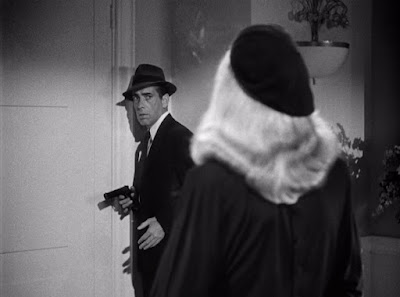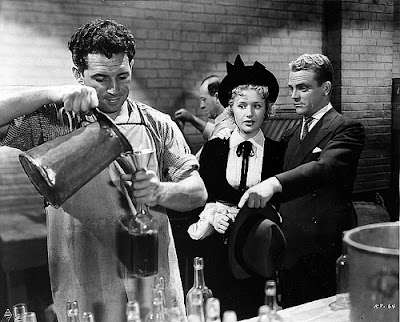 Dead Reckoning (John Cromwell, 1948) Notice the title in the poster—John Cromwell's Dead Reckoning, (as it is in the film's credits) indicating a special prominence. Producers don't allow the possessive credit (relinquishing some of their ownership, which they only do kicking and kvetching) unless the director is so powerful they can't refuse.
Dead Reckoning (John Cromwell, 1948) Notice the title in the poster—John Cromwell's Dead Reckoning, (as it is in the film's credits) indicating a special prominence. Producers don't allow the possessive credit (relinquishing some of their ownership, which they only do kicking and kvetching) unless the director is so powerful they can't refuse.So, who's this John Cromwell?
We'll get to that; how's the movie? Well, it's Bogart—not looking too healthy and struggling with the material, although it's tailor-made for him...if measured a bit too tightly. But it's warmed-over Bogart, stale and picked from elements of Bogart movies past, with all the presentation of a Chef's Mess. And you know how it is when you get the last leavings of anything Bogarted: not only is there a feeling of disappointment, but also a feeling of resentment.Things start off well enough: Bogie's a coming-home paratrooper with his buddy to receive medals for valor, but before they can exit the train, the buddy disappears, prompting Bogart's character to start a search to see what's at the bottom of it. The film is introduced by Bogart's character eluding the police, and ducking into a church where, in complete shadow, he makes a confession of sorts to a priest serving as a first-person narration. So far, so good. However, the narration, like the dialog, is as purple as can be, with tortured metaphors and a desperation to remind of Bogart's detective roles (the best of which were done—of course—without narration).* We're introduced to the buddy's wife, Carol "Dusty" Chandler (Lizabeth Scott, meant to evoke Lauren Bacall, no doubt, but more of a bleached, washed out version of her), a low-throated chanteuse at a club run by the mob—and although it's surely unintentional, you get the impression that she must be sleeping with the owner, as Scott can't sing well, even by Bacall's (or the young Andy Williams')** standards.
The movie lurches along with some fine shadow-play, photographically, but that's about it, and it ends with one big howler of a leaden line, meant to have deep meaning and import, but is merely typical of the dumb lines Bogie has to chew through. There are a lot of immortal lines associated with Humphrey Bogart: "Geronimo, baby" is not one of them. ***So, who's John Cromwell and why was he given possession of this stinker of a movie?
John Cromwell was a well-respected actor, who was also put of the directing fast-track at Paramount Studios when he signed with them in 1928. He continued in his capacity as an actor throughout his career, winning a Tony Award in 1952 for "Point of No Return" and appearing in Robert Altman's 3 Women, and A Wedding late in life.
But forget Dead Reckoning for a moment. Look at some of the other films he directed: the 1930 version of Tom Sawyer, the Bette Davis-Leslie Howard version of Of Human Bondage, the Freddie Bartholomew version of Little Lord Fauntleroy, the Ronald Colman version of The Prisoner of Zenda, Algiers with Charles Boyer and Hedy Lamarr, Abe Lincoln in Illinois with Raymond Massey, Son of Fury with Tyrone Power, the "they also serve" war movie Since You Went Away, Anna and the King of Siam with Rex Harrison and Irene Dunne, the lurid Caged with Eleanor Parker. These are really good, and sometimes spectacular films made with a fine craftsman's hand.
So, why is John Cromwell not mentioned in the same breath as Hawks and Ford and the other film-makers of their generation?The answer is simple. Cromwell was black-listed during the McCarthy era and his career seemingly thrown into a black-hole. Born in 1887, he was in his 60's when he filmed Paddy Chayefsky's The Goddess in 1958. He was still pushing the envelope of what could be brought to the screen at the tail-end of his career.
You might also know him as the father of actor James Cromwell.
Dead Reckoning aside, a re-evaluation and appreciation of his career as a pioneering film-maker is very much overdue.* You'll also recognize lines and sentiments from The Maltese Falcon, To Have and Have Not, and The Big Sleep. More than once, the film evokes a "Deja Vu" feeling: "Now, where have I heard a better version of that?"
** The story goes that Andy Williams, when he was a kid, dubbed in Bacall's singing voice for one of her movies, but I've yet to see any concrete evidence (and a lot denying it) that that was the case, and not some malicious gossip (Bacall got a lot of that).
** The story goes that Andy Williams, when he was a kid, dubbed in Bacall's singing voice for one of her movies, but I've yet to see any concrete evidence (and a lot denying it) that that was the case, and not some malicious gossip (Bacall got a lot of that).
*** I think you have to chalk this one up to that period of time between the acknowledgement of Bogart as a big box-office star, and studios trying to figure out what to do with him. The roles and writing became better once Bogart took charge of his career and formed his own production company.


















































